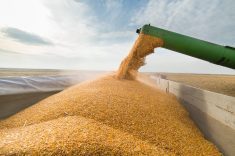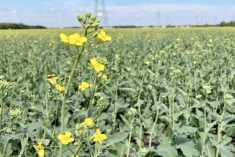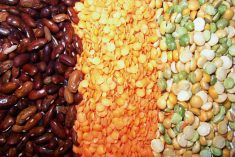The search is on for a way to allow higher-yielding wheats while protecting Western Canada’s reputation as a premium producer of red spring and amber durum wheat.
“All of the sectors affected by variety registration have come together in a very positive spirit to work towards developing something that will address the concerns and preserve the existing brands,” said Patty Townsend, executive vice-president of the Canadian Seed Trade Association.
The debate over protecting the milling and baking quality of the West’s premium wheat classes — Canada Western Red Spring (CWRS) and Canada Western Amber Durum (CWAD) — versus the desire of farmers to grow what they believe to be higher-yielding wheats, including Dark Northern Springs from the U.S., has gone on for years. But the pending demise of the Canadian Wheat Board has prompted more calls for “medium-quality” higher-yielding varieties. Some question the need for variety registration and Western Canada’s system of eight milling wheat classes, plus the general purpose class, saying the marketplace should determine what farmers grow.
Read Also

Senft to step down as CEO of Seeds Canada
Barry Senft, the founding CEO of the five-year-old Seeds Canada organization is stepping down as of January 2026.
“Western Canada is known for some of the best-quality wheat in the world,” Moose Jaw farmer Vaughn Cone said at the recent Farming for Profit conference. “We need to take that badge off and throw it in the bush.”
Saskatoon farmer and former board director Cam Goff acknowledges high-quality Canadian wheat doesn’t always fetch a premium when supplies are high. But he argues you don’t have to chuck the current system as long as lower-quality wheats aren’t sold in the CWRS class.
One example is SeCan’s Pasteur, a new general-purpose wheat aimed at the feed and ethanol markets. Last year in Manitoba, it outyielded AC Barrie, a CWRS wheat, by 34 per cent.
Registration system supporters say farmers benefit because new wheats meet specific disease resistance and agronomic standards — and setting end-use quality standards has made Canada famous for consistency, which boosts sales and usually generates premiums.
The Canadian Seed Trade Association is trying to bridge the gap — starting with an April meeting attended by a cross-section of industry representatives from the private and public sectors, as well as farmers,.
“It was a very good meeting,” Townsend said. “A number of working groups were struck.”
The goal isn’t just finding a way to accommodate farmers wanting to grow American wheats, it’s also about attracting beneficial germplasm for Canadian plant breeders to work with, she added.
Since the process is ongoing, she declined to comment further. But an industry source, who asked not to be named, said there was unanimous support to keep the wheat class system and protect the CWRS and CWAD classes.
Grain handlers like the class system because it allows them to commingle different varieties so long as they are in the same class. “Handlers don’t want to segregate 47 different varieties of wheat,” the source said.
The system also works well for end-users who get a consistent product cargo-to-cargo, year-to-year.
A Dark Northern Spring wheat class is also being discussed, although the industry is generally isn’t keen as it would tie up more elevator space. One alternative would be to broaden the quality standards for an existing class, such as Canada Prairie Spring (CPS) red, to accommodate American wheats.
But for critics such as Cone, it comes down to revenue per acre — not price per bushel. “It’s simple math,” he said. “I really don’t care if they take my bushel of wheat and make fence posts out of it.”
According to one industry source, Pasteur has the potential to yield 100 bushels an acre. It can fetch as much as $6 a bushel at ethanol plants, generating a gross $600 an acre.



















